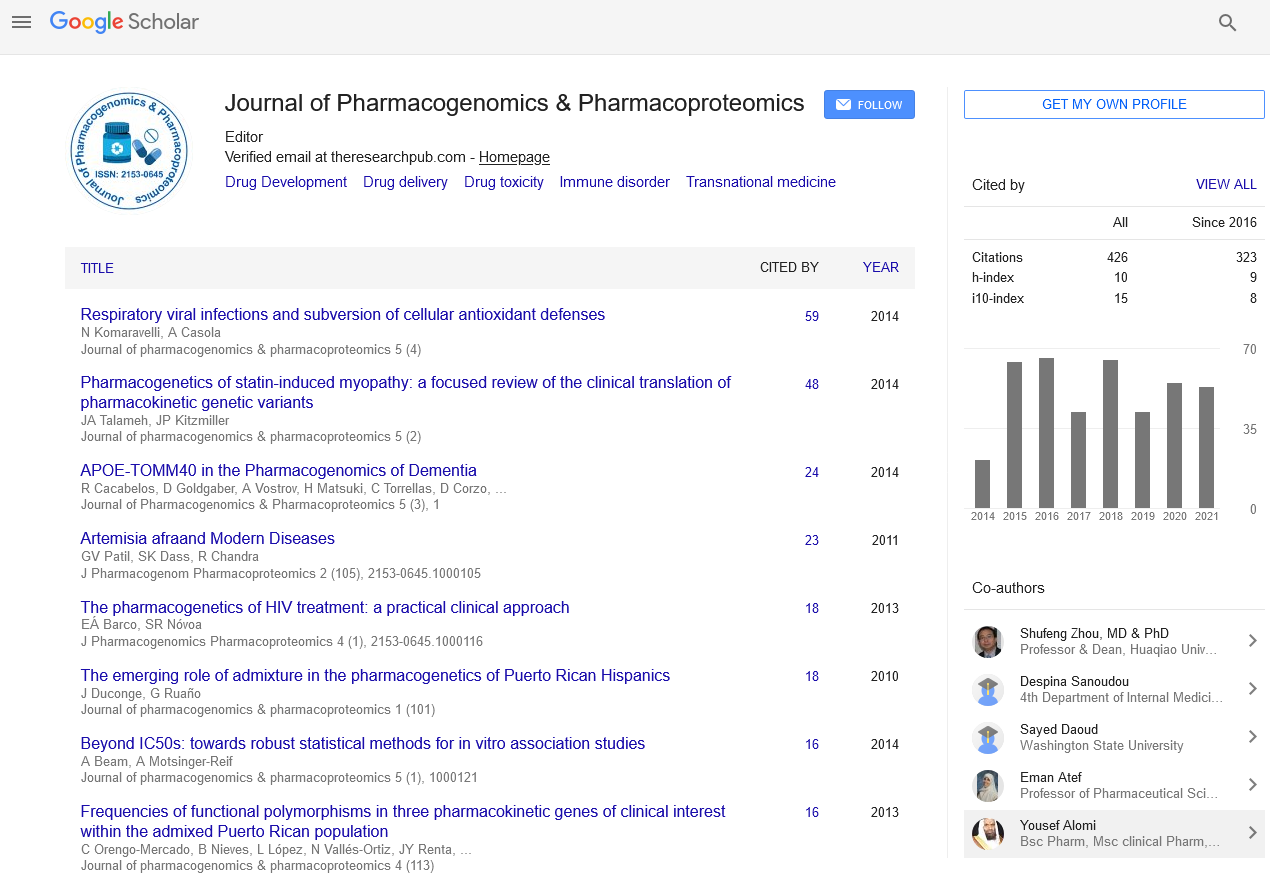Indexed In
- Open J Gate
- Genamics JournalSeek
- Academic Keys
- JournalTOCs
- ResearchBible
- Electronic Journals Library
- RefSeek
- Hamdard University
- EBSCO A-Z
- OCLC- WorldCat
- Proquest Summons
- SWB online catalog
- Virtual Library of Biology (vifabio)
- Publons
- MIAR
- Euro Pub
- Google Scholar
Useful Links
Share This Page
Journal Flyer

Open Access Journals
- Agri and Aquaculture
- Biochemistry
- Bioinformatics & Systems Biology
- Business & Management
- Chemistry
- Clinical Sciences
- Engineering
- Food & Nutrition
- General Science
- Genetics & Molecular Biology
- Immunology & Microbiology
- Medical Sciences
- Neuroscience & Psychology
- Nursing & Health Care
- Pharmaceutical Sciences
Zinc in human health: Its discovery 50 years ago and the current impact
2nd International Conference on Predictive, Preventive and Personalized Medicine & Molecular Diagnostics
November 03-05, 2014 Embassy Suites Las Vegas, USA
Ananda S Prasad
Keynote: J Pharmacogenomics Pharmacoproteomics
Abstract:
The essentiality of zinc in humans was established in 1963. During the past 50 years, tremendous advances in both clinical and basic sciences of zinc metabolism in humans have been observed. Major clinical problems resulting from zinc deficiency in humans include growth retardation; cell-mediated immune dysfunction, and cognitive impairment. In 1963, we knew about only 3 enzymes that required zinc for their activities, but now we know >300 enzymes and >1000 transcription factors that are known to require zinc for their activities. Zinc is a second messenger of immune cells, and intracellular free zinc in these cells participates in signaling events. Zinc has been very successfully used as a therapeutic modality for the management of acute diarrhea in children, Wilson?s disease, the common cold and for the prevention of blindness in patients with age-related dry type of macular degeneration and is very effective in decreasing the incidence of infection in the elderly. Zinc not only modulates cell-mediated immunity but is also an antioxidant and anti-inflammatory agent.
Biography :
Ananda S Prasad has been at Wayne State University since 1963 when he took a position as Director of the Division of Hematology, a post he held until 1984 when he became the Director of the Division of Research. He has also been a Professor of Medicine at Wayne from 1968 until the present. He was appointed as Distinguished Professor of Medicine, Division of Hematology-Oncology in 2000. He is author of twelve books and over three hundred scientific articles. His several papers have been cited as citation classics. He has received many awards, which include Goldberger award (AMA), Mastership of the American College of Physicians, Robert H. Herman award (ASCN), Medal of Honor from the Mayor of Lyon, France, Honorary doctorate from Claude Bernard University, Lyon, France, election as corresponding member of The European Academy of Sciences, Arts and Humanities, and American College of Physicians? (ACP) highest award for outstanding work in science as related to Medicine. In 2010, he received the prestigious Mahidol Award from Royal Highness King of Thailand for his discovery of zinc as an essential element for human health. In 2011, he received a Congressional Commendation for his lifelong studies involving zinc as an element essential for human survival. In May of 2012, he received The Lawrence M. Weiner Award, honoring outstanding contributions of non-alumni to the School of Medicine through the exceptional performance of his research at Wayne State University. Most recently, The American College of Nutrition will honor him as a distinguished Professor of Internal Medicine, with its 2014 Alexander and Mildred Seelig Magnesium Award.


